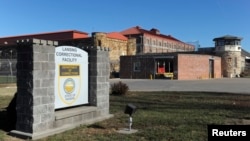The shuttered Kansas prison where the killers chronicled in Truman Capote's In Cold Blood were executed is now a tourist attraction.
Starting Friday, former wardens and corrections officers will lead two-hour tours of the stone-walled building in Lansing that first began housing inmates in the 1860s, The Kansas City Star reported.
The building, originally called the Kansas State Penitentiary, was without purpose after the Kansas Department of Corrections opened the newly constructed Lansing Correctional Facility in 2020. But instead of demolishing it, the Department of Corrections transferred control of the building to the Lansing Historical Society and Museum.
Upcoming events include a car show inside the prison walls later this month.
“We’re expecting the prison to open up to large crowds who want to know what went on inside those walls,” Debra Bates-Lamborn, president of the society, said after state prison officials handed over the keys this week.
For years, the prison carried out executions by hanging at the gallows — a site that visitors will not be able to access during tours. Since removed from prison grounds, the wooden gallows are now disassembled and under the state’s custody.
Among the notable inmates executed at the prison were Richard “Dick” Hickock and Perry Smith, who were convicted of murdering four members of the Clutter family on Nov. 15, 1959, in the family's home near Holcomb, Kansas.
Capote, along with his close friend and fellow writer Harper Lee, visited the prison while doing research for the book about the killings. Hickock and Smith were executed in April 1965, among the last inmates to be hanged in the state.
One spot on the tour is the Chow Hall, where the late country music legend Johnny Cash performed for inmates in 1970.
“Johnny Cash has always said that audiences in prisons are the most enthusiastic audience he’s ever played to,” Bates-Lamborn said.
The prison tour is modeled off of a similar tour in Missouri. About a year ago, a state lawmaker approached the Lansing Historical Society and Museum with the idea of preserving the prison by converting it into a tourist attraction.
Bates-Lamborn said she and another board member made the trip to Jefferson City to tour the Missouri State Penitentiary, which has been open for tours since 2009.
“Afterwards, I thought ours is a shoo-in and we’re so much better,” she said.
Tours of the facility will be held on Fridays, Saturdays and Sundays, and are scheduled to run until October 26. Since the facility has no heat or electricity, the tours stop over the winter and will return in the spring.




